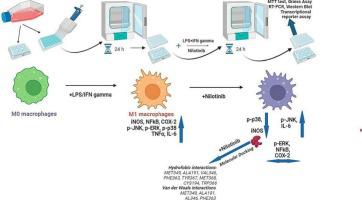Toxicology in Vitro ( IF 2.6 ) Pub Date : 2023-12-05 , DOI: 10.1016/j.tiv.2023.105754 Arzu Zeynep Karabay 1 , Tulin Ozkan 2 , Asli Koc 1 , Yalda Hekmatshoar 3 , A Selen Gurkan-Alp 4 , Asuman Sunguroglu 2

|
In this study, we aimed to analyze the effects of first and second-generation Bcr-Abl tyrosine kinase inhibitors, imatinib and nilotinib on LPS/IFN gamma activated RAW 264.7 macrophages. Our data revealed that imatinib was less effective on nitrite levels and more toxic on macrophages compared to nilotinib. Therefore, we further analysed the effect of nilotinib on various inflammatory markers including iNOS, COX-2, NFkB, IL-6, p-ERK, p-p38 and p-JNK in LPS/IFN gamma activated RAW264.7 macrophages. Spectrophotometric viability test and Griess assay,western blot, RT-PCR and luciferase reporter assays were used to analyze the biological activity of nilotinib. Our findings revealed that nilotinib decreases nitrite levels, iNOS mRNA, iNOS and p-p38 protein expressions significantly whereas induces IL-6 mRNA and p-JNK protein expressions at particular doses. We did not find significant effect of nilotinib on COX-2, p-ERK and nuclear p65 proteins and NFkB transcriptional activity. In addition, the binding mode of nilotinib to iNOS protein was predicted by molecular docking. According to the docking analyses, nilotinib exhibited hydrophobic interactions between MET349, ALA191, VAL346, PHE363, TYR367, MET368, CYS194, TRP366 residues at the binding pocket and the molecule as well as van der Waals interactions at specific residues. In conclusion, our results reveal that, in addition to its anticancer activity, nilotinib can exhibit immune modulatory effects on macrophages through its effects on iNOS, IL-6, p-p38 and p-JNK.
中文翻译:

尼洛替尼的毒性比伊马替尼低,并通过调节 LPS/IFN γ 激活的巨噬细胞中的 iNOS、p-p38 和 p-JNK 影响免疫状态
在本研究中,我们旨在分析第一代和第二代 Bcr-Abl 酪氨酸激酶抑制剂伊马替尼和尼洛替尼对 LPS/IFN γ 激活的 RAW 264.7 巨噬细胞的影响。我们的数据显示,与尼洛替尼相比,伊马替尼对亚硝酸盐水平的影响较差,对巨噬细胞的毒性更大。因此,我们进一步分析了尼罗替尼对LPS/IFNγ激活的RAW264.7巨噬细胞中各种炎症标志物的影响,包括iNOS、COX-2、NFkB、IL-6、p-ERK、p-p38和p-JNK。采用分光光度法活力试验、Griess试验、蛋白质印迹法、RT-PCR和荧光素酶报告基因试验分析尼罗替尼的生物活性。我们的研究结果表明,特定剂量的尼罗替尼可显着降低亚硝酸盐水平、iNOS mRNA、iNOS 和 p-p38 蛋白表达,同时诱导 IL-6 mRNA 和 p-JNK 蛋白表达。我们没有发现尼洛替尼对 COX-2、p-ERK 和核 p65 蛋白以及 NFkB 转录活性有显着影响。此外,通过分子对接预测了尼罗替尼与iNOS蛋白的结合模式。根据对接分析,尼罗替尼在结合口袋处的MET349、ALA191、VAL346、PHE363、TYR367、MET368、CYS194、TRP366残基与分子之间表现出疏水相互作用,以及在特定残基处的范德华相互作用。总之,我们的结果表明,除了抗癌活性外,尼罗替尼还可以通过对 iNOS、IL-6、p-p38 和 p-JNK 的影响,对巨噬细胞发挥免疫调节作用。































 京公网安备 11010802027423号
京公网安备 11010802027423号